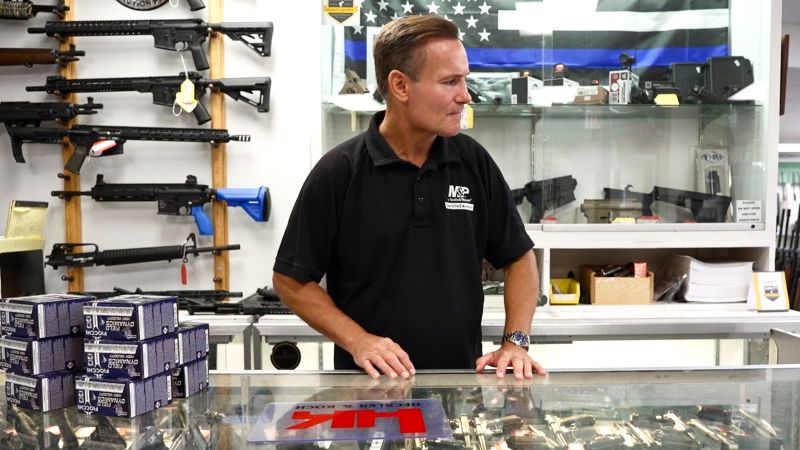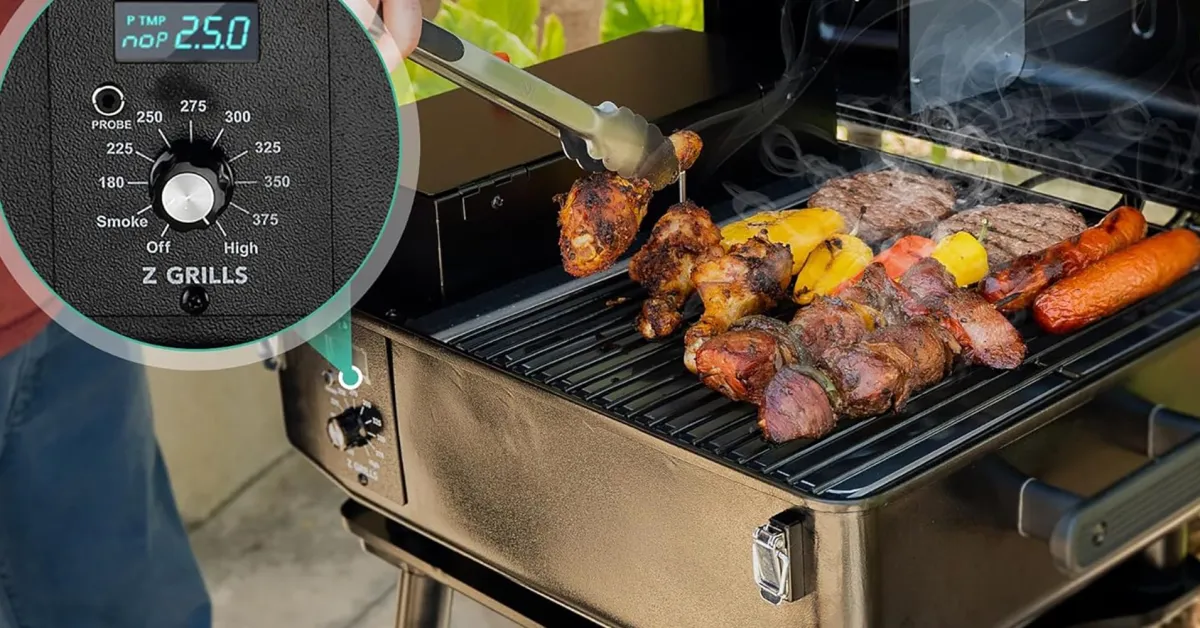How a Minneapolis gun store that prides itself for identifying warning signs missed a mass shooting suspect

Five federal agents entered the gun store on the busy highway in central Minnesota that Chris Mercadante manages and gave him a serial number.
Unfamiliar, he flicked through the book that keeps a record of every gun that passes through Frontiersman Sports gun shop until he spotted it. It belonged to a revolver purchased by a customer just four days prior.
That customer had opened fire on Annunciation Catholic School in Minneapolis just hours earlier, authorities say, firing through the windows at the pews, killing two children and wounding 18 other people.
Worry had been stirring within 60-year-old Mercadante even before the FBI and Bureau of Alcohol, Tobacco, Firearms and Explosives agents showed up at the store on August 27 – ever since he heard about the devastating mass shooting carried out just 10 miles away.
“You never want to hear this, you never want to see this, you never want to be a part of this,” he said, adding there’s always a concern a gun used to carry out a mass shooting could have come from his store.
After confirming to the agents that the customer purchased a .38 special caliber revolver and its ammo from the store, he found surveillance footage of the shooter shopping for guns and browsing ammo on August 23.
The suspect – identified by police as Robin Westman – was inside the store for 40 minutes, talking and laughing with other employees, as well as a customer, and testing out different firearms, the eerie footage shows.
While police have not mentioned a revolver being used in the shooting at Annunciation, the sight shook the store workers with years of experience who took pride in going the extra mile to make sure their guns didn’t fall into the wrong hands.
Mercadante, who wasn’t working the day the suspect came in, says he prayed with his staff, including the ones who spoke to the suspected shooter.
They all agreed: The normal red flags they’re trained to catch weren’t there.
The customer asked the right questions, appeared friendly, acted “normal” and seemed very knowledgeable about guns, one of the employees who was working when the suspect came in told CNN.
“I just couldn’t believe it,” said the employee, who asked not to be named for privacy reasons. “The person didn’t seem like there was anything abnormal going on with them.”
Kory Krause, the owner of Frontiersman Sports, said he felt like he needed to “take a shower” after watching the footage of the suspect in the store he’s owned for 16 years.
It’s important for Krause that his employees pick up on even the most subtle warning signs. They refuse to sell firearms to shoppers they suspect may be a danger to themselves or others, seem mentally unstable, are under the influence of drugs or alcohol or appear to be purchasing a gun for someone else, Krause said, adding sometimes they’ll turn away multiple people in one week.
“We do not discriminate based on race, ethnicity, sex, age, sexual orientation, or appearance. We do discriminate based solely on behavior and actions,” Krause said.
There is no mention of the revolver purchased at Frontiersman Sports in police search warrant documents related to the shooting investigation, which list a Magpul semi-automatic rifle, a Taurus semi-automatic pistol and a Mossberg pump-action shotgun among the evidence collected. When asked by CNN, police could not comment on whether a revolver was taken into evidence.
Still, Frontiersman Sports’ youngest employee was the person who sold the suspect the gun, and Krause said the incident has affected him.
“You always sit back and go, ‘Could I have done more?’ … ‘Did something stand out that I didn’t see?’” Mercadante said. “The (suspect) was smiling and joking and laughing. I mean, if that’s not evil, I don’t know what is.”
Spotting red flags in shoppers
While Minnesota state laws already prohibit the sale of guns to those with a criminal record or who have been adjudicated as mentally ill, among other restrictions, Krause says his store goes above and beyond to try to make sure their guns don’t end up with bad actors.
Mercadante, who has been a US Concealed Carry Association and NRA instructor for 20 years, said weeding out the bad eggs is not an exact science.
One big thing they look for is straw purchases, whether a person is trying to buy a gun for someone who can’t legally purchase one.
“(My guys) are watching everything very closely. They’re even watching outside,” said Krause. “They see it coming. They see it before it even comes in the door a lot of the time.”
His staff is attuned to when a car full of people pulls up to the store, but only one person comes inside – especially if that one person is a young girl with a specific gun model in mind.
In fact, two years ago the store decided to ban phone use. They caught one too many people taking photos of guns to send to someone else to buy for them.
They’ll also look for other red flags in shoppers that point to mental health issues.
Sometimes it’s obvious. One time a person came into the store saying, “I’m so sick of that g**damn neighbor. I’m going to get a gun,” Krause said.
“It’s like, ‘Nah, no you’re not,’” he said.
But most of the time it’s more subtle. The staff think about the questions the person is asking about guns. They notice if the person is sweating or stumbling over their words. They also take note of how they’re holding the gun.
“It’s not what they’re buying, it’s more about how they’re acting when they are buying the gun,” Mercadante said. “Sometimes you just get a feeling that they’re not being upfront with you.”
The process by which the staff learn how to identify potential bad actors is constantly evolving, with some formal training but a lot of discussing issues and red flags as they arise, they said.
Krause recalled a time when an elderly shopper struggling to hold a gun asked to buy a revolver and just one round of ammunition, as opposed to the whole box – details that led staff to suspect the man may be suicidal and refuse to sell him the gun.
In situations like this, Mercadante said he tells customers that he’s not comfortable selling them a gun and explains his reasoning. From there, he’ll contact local authorities to speak with the person they suspect to be suicidal.
Krause added that they’ll also notify other gun shops in the area to give them a heads up.
The store has also taken additional measures after Charlie’s Kirk’s shooting on September 10, like being prepared to deny guns to people wearing the same distinctive American flag and eagle T-shirt that Kirk’s shooting suspect wore. Depending on the customer’s actions, they’ll also call the ATF or local police.
When Mercadante has a gut feeling that something isn’t right, sometimes he’ll ask one of his staffers for a second opinion. Mercadante said upset shoppers have accused him of discrimination and threatened to sue him for refusing to sell, but that never changes his mind.
“I’m not going to let a gun go out if I don’t feel like it’s right,” he said.
Suspect had permit to buy guns
The interaction with Westman was like any another: The customer spoke about revolvers and seemed knowledgeable, said the employee who was at the store that day.
“I kind of thought that this might be one of our next repeat customers that comes in quite often because they didn’t sound like they lived too far and knew what they were talking about,” the employee said.
Besides the scrutiny from behind the counter, customers also need to pass the FBI’s National Instant Criminal Background Check System (NICS) to be able to buy a firearm. That means that a customer fills out a form, Mercadante submits it online, and then he gets a response usually within five minutes that says “approve,” “delay,” or “deny.”
A shopper can receive a denial for several reasons, including for having a criminal record, an addiction to a controlled substance, previous time in a mental institution, a court order related to certain domestic violence charges – or because of red flag laws.
Minnesota customers also need permits to purchase or carry handguns and semi-automatic assault weapons, which require background checks.
Westman had recently been issued a permit to purchase, according to Minneapolis police. A search of state court records also showed no criminal history for the suspect, but some traffic citations in 2021.
In Minnesota, an Extreme Risk Protection Order (ERPO) allows family members and law enforcement to request an order from the court to temporarily prohibit someone from buying or possessing a firearm. There is no record of an ERPO being filed for Westman, according to Hennepin County District Court spokesperson Matt Lehman.
Denying guns to trans people isn’t the answer, owner says
In the wake of the Minneapolis shooting, CNN reported that senior Justice Department officials were weighing proposals to limit transgender people’s right to possess firearms by declaring that transgender people are mentally ill, according to two officials familiar with the internal discussions.
News of the talks came after federal officials referred to the suspect in the church shooting as transgender, and a name change petition approved in 2020 noted the person identifies as female.
Krause said a ban of this nature wouldn’t solve any issues and would be difficult to enforce. He said the focus needs to be more on mental health issues, and he doesn’t believe being transgender is a mental illness.
Being transgender is not a psychiatric diagnosis, according to the American Psychiatric Association. Some transgender people do experience gender dysphoria, which is a diagnosable condition that occurs when a person has clinically significant distress over the incongruence between their gender and sex assigned at birth, which can cause impairment in social situations, work or other important areas of life.
The vast majority of mass attacks in the US have no connection to transgender people.
From January 2013 to the present, of the more than 5,700 mass shootings in the United States, five shooters were confirmed to be transgender, according to Mark Bryant, founding executive director of the Gun Violence Archive. CNN and the GVA define a mass shooting as one that injured or killed four or more people, not including the shooter.
Frontiersman Sports, situated on a busy highway, sees a variety of customers, including transgender people who are regulars at the store, the owner said.
“We have a trans couple, for instance, that they’re prolific shooters. They love to shoot. They’re range shooters. They collect guns. They buy guns … but they’re not mentally ill or unstable,” Krause said.
Krause wondered how his staff would even be able to identify transgender customers or properly enforce this type of ban.
“That opens a can of worms that I think is absolutely ridiculous, frankly. I don’t know how you would differentiate,” Krause said. “We’re not going to be doing body inspections.”
Mercadante emphasized that he and the others wish they could go back in time to stop the shooting.
“You have to move on from these things, not that you want to move on from what happened, but you always want to remember it,” Mercadante said. “You always want to make sure that you keep your senses and your awareness up, and it gets up a little bit higher because you want to be the one that stops the next one.”



